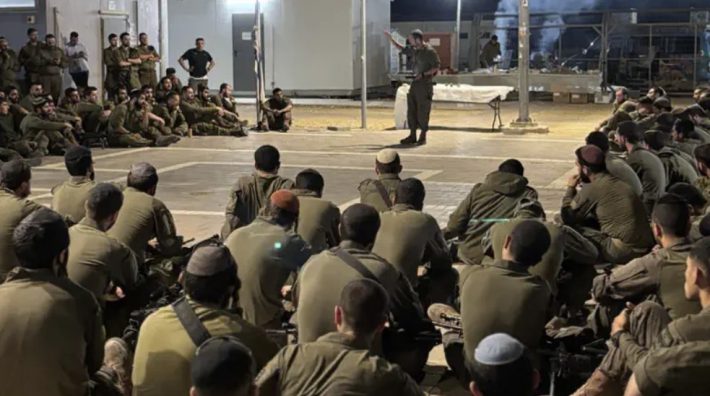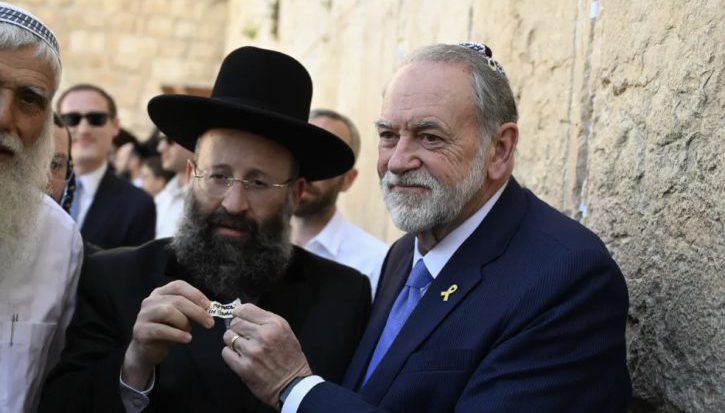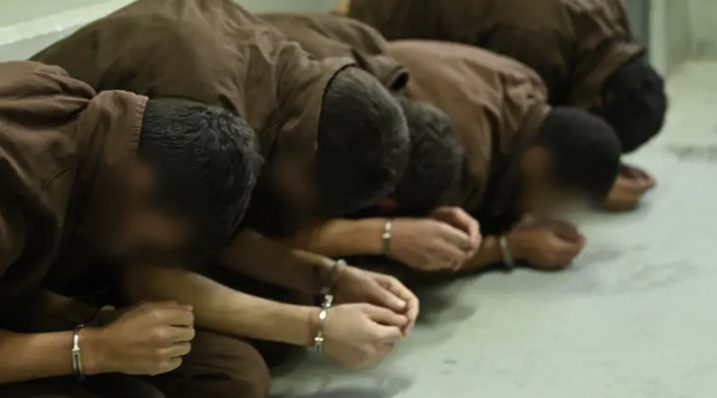Let me say it clearly: The halakhic imperative for haredi military service is clear and unambiguous.
The debate over Haredi military service in Israel has intensified following the October 7th Massacre. This exemption for Torah study, which was accepted at Israel’s founding in 1948 in order to restore the Torah learning that had been destroyed in the Holocaust, has become an issue of contention as the numbers of exemptions grew exponentially over the years since then and the supervision decreased. It raises fundamental questions about religious obligation, national unity, and the role of Torah study in protecting the Jewish people. A careful examination of Jewish law finds a need for Torah learning to be protected in a Jewish state, but no halakhic basis for blanket haredi exemption from military service.
Jewish law is unequivocal regarding military service in times of war. According to the Torah, every able-bodied Jewish male from the age of 20 (except for Levites and Kohanim) is required to serve in Milchemet Mitzvah (existential war), a war of obligation for the defense of Jewish lives and the land of Israel. This principle is clearly established in the Mishnah (Sotah 8:7), which states that while certain exemptions apply in discretionary wars, in a Milchemet Mitzvah, “everyone goes out, even the groom from his chamber and the bride from her wedding canopy.”
The Jerusalem Talmud (Sotah 8:6) further clarifies this principle, stating that while offensive wars require specific authorization, defensive wars are obligatory for all. Rabbi Judah specifically taught that when enemies attack us (“when they come against us”), it becomes a war of obligation that requires universal participation.
Maimonides codified this ruling in his Laws of Kings (7:4), explicitly stating that a Milchemet Mitzvah includes “aid to Israel when an enemy attacks them.” This means that in defensive wars, such as all of Israel’s conflicts since 1948, it is a mitzvah for every man and woman to serve in the army. A war of this kind must be declared by the Sanhedrin, so the State of Israel’s wars technically do not fit the halakhic definition, but that hardly serves as an excuse when danger is imminent because the principle of pikuach nefesh (saving lives) takes precedence over all mitzvot in the Torah except for idolatry, sexual immorality, and murder.
This halakhic position is reinforced by the principle of “he who comes to kill you, rise up and kill him first” (Sanhedrin 72a), which applies not only to individual self-defense but also to national defense. When Israel is under attack, the obligation to defend extends to every able-bodied citizen.
Historical Examples of Torah Scholars in Military Service.
Throughout Jewish history, many of our greatest Torah scholars have also served in military leadership roles. Moses led the Jewish people in battle against Amalek, while Joshua served as both a military commander and spiritual leader. King David was also a warrior king who led Israel’s armies to victory.
The Maccabees, led by Mattathias and his sons, were both Torah scholars and military leaders who successfully fought against the Hellenistic oppressors. Rabbi Akiva, one of the greatest sages of the Mishnah, supported Bar Kochba’s rebellion against Roman rule. In medieval times, Rabbi Samuel Hanagid (993-1056) served as both a leading halakhic authority and the head of Granada’s army for eighteen years.
These historical examples demonstrate that Torah study and military service are not mutually exclusive. On the contrary, they show that our greatest leaders understood the importance of both spiritual and physical defense of the Jewish people. The Torah teaches that we must be prepared to defend ourselves, as exemplified by the story of the tribes of Gad and Reuven, who were rebuked by Moses for initially refusing to join their brothers in battle.
The issue of haredi military service has evolved significantly since Israel’s founding. In 1948, only 400 yeshiva students were exempted from service. However, after the Likud came to power in 1977 and eliminated quotas, the numbers grew dramatically: 8,257 in 1977, 16,011 in 1986, 24,000 in 1992, 36,887 in 2002, and 63,000 in both 2012 and 2024. This has created a significant burden on the rest of Israeli society, where citizens serve in both the regular army and perform annual reserve duty.
The current stance of haredi leadership against military service represents a significant departure from earlier religious attitudes. A telling example comes from the family history of Haim Hirsh Eisenbach, a revered Jerusalem religious figure whose wisdom was sought by the Beis Yisroel, the Gerrer Rebbe, himself before Rosh Hashanah each year. When Eisenbach was asked about his grandchildren serving in the IDF, he responded simply that he was not concerned about negative influences on his descendants. This modest but profound man understood that the people of Israel must be preserved and defended, and that Jews must stand up to ensure their continuity and success.
Many of the current haredi leadership have shifted significantly from those values. When some of Eisenbach’s descendants were recently asked why their children and grandchildren refuse to serve in the IDF, they respond that their great-grandfather “was much stronger” and that they themselves were “not strong enough to influence their children properly.” There are certainly ways to get around this fear, especially now with the Hasmonaim Battalion.
And this admission reveals a troubling reality: haredi leaders have made a destructive decision to forbid young able-bodied men from serving in Israel’s defense forces, not based on halakhic foundation, but either because they don’t trust their ability to absorb what they have been taught and remain haredi in the army or in an effort to maintain control and power over the haredi population. Very similar to the anti-Zionism exhibited by haredi leaders in early 20th century pre-Holocaust Europe.
This approach may ultimately prove tragic for the haredi community. As more young people replace throw their Kosher phones with cell phones open to the “forbidden” secular internet environment and understand that they were misled into not defending their country for lack of trust in their children, and political, economic, and social reasons, rather than halakhic ones, they may reject not just the current leadership but potentially all the positive elements that the haredi community can bring to the State of Israel.
Haredi leadership have presented several arguments to justify their position against military service, but each can be refuted through careful halakhic analysis:
1. “Rabbis do not need guarding” – This argument, based on a statement by Resh Lakish in Bava Batra 7b, is taken out of context. The original ruling referred to exemption from taxes for city wall construction, not from saving lives or participating in an existential war. Furthermore, the statement only suggests that scholars themselves might not need defense, not that their Torah study protects the entire Jewish people.
2. “Like the Levites” – Some haredim claim that yeshiva students should be treated like the tribe of Levi, exempt from military service. This argument misinterprets Maimonides’ words in Laws of Sabbatical and Jubilee 13:13, which actually refers to “all human beings” who dedicate themselves to divine service, not specifically to Torah study. The passage makes no mention of military service exemption.
3. “Only the Torah protects the people of Israel” – This argument is true, insofar as the Torah protects the Jewish people from extinction, and it also justifies the Jewish State supporting yeshiva study.
But it is based on an aggadic statement in Sotah 21a and understanding it in a literal fashion ignores the simple meaning of the text. Rashi explains that the Torah protects from suffering and saves from the evil inclination, not from physical threats like bullets and missiles. Historical evidence—from the destruction of the Second Temple to the Holocaust—demonstrates that Torah study alone did not protect against physical threats.
4. “Better death than becoming secular” – This argument reveals the true concern behind haredi opposition: the fear that military service might lead to secularization. However, this concern is outdated (see Hashmonaim Battalion above).
5. The principle of Dina D’malkhuta Dina (The Law of the Land is the Law) further strengthens the case for haredi military service. Major halakhic authorities, including the Hatam Sofer, Rabbi David Tzvi Hoffmann, and Rabbi Moshe Shmuel Glasner, ruled that Jews are obligated to serve in their country’s army, even if it might involve desecrating the Sabbath or eating non-kosher food. Rabbi Glasner emphasized that such service constitutes a kiddush Hashem (sanctification of God’s name), while Rabbi Hoffmann warned that evading service through subterfuge creates a hillul Hashem (desecration of God’s name).
The October 7th massacre, which claimed 1,200 lives, has made the issue of military service more urgent than ever. The concept of a “small, smart army” pushed by Ehud Barak and others of his ilk which made the exemptions feasible, has been disproven and replaced by the need for a “large, smart army.”
The war against Hamas is clearly a matter of pikuach nefesh, where saving lives takes precedence over all other considerations. The current situation demands unity and shared responsibility among all segments of Israeli society.
The halakhic imperative for haredi military service is clear and unambiguous. The blanket exemption of yeshiva students from military service has no basis in Jewish law and creates a hillul Hashem that distances secular Jews from Judaism. As the Torah teaches, “Shall your brothers go to war, while you sit here?” (Numbers 32:6). The time has come for the haredi community, except for those learning Torah day and night in both haredi and religious Zionist yeshivas who are deserving of exemptions, to recognize their halakhic and moral obligation to serve in the IDF, not only to protect their families and people but to fulfill their religious duty as Jews.
The solution is not to exempt haredi youth from service en masse, but instead to support them, prepare them, and strengthen them. The IDF has already demonstrated its willingness to accommodate religious needs, and many haredi young men have shown their commitment to serving their country while maintaining their religious practices.
The IDF has often not fulfilled its religious promises to Hesder yeshiva heads and it still does not know whether it prefers female soldiers in every unit to haredi soldiers in every unit. They cannot exist concurrently. It also unwisely voices fears of religious takeover and up to now, has had a glass ceiing preventing religious soldiers from reaching the top.
Still, the IDF has evolved significantly as demonstrated by the Netzah Yehuda Battalion (also known as Nahal Haredi) established in 1999. The battalion provides: glatt kosher food, daily Torah study sessions, gender-segregated training and living quarters, religious guidance and support from military rabbis, and accommodations for prayer and religious holidays.
The success of the Netzah Yehuda Battalion and the even more stringent new Hasmonaim Battalion demonstrates that military service and religious observance can coexist. Many Haredi soldiers have found that their service actually strengthens their religious commitment, as they learn to apply Torah values in real-world situations. The unit has produced numerous officers and has been deployed in various security operations, proving that religious soldiers can be both effective soldiers and committed Torah scholars.
The path forward requires mutual understanding and accommodation. The IDF must continue to provide appropriate religious accommodations, while the haredi community must acknowledge their responsibility to contribute to Israel’s defense. Only through such cooperation can we achieve the unity necessary to face the challenges ahead and fulfill our collective mission as a Jewish state.





